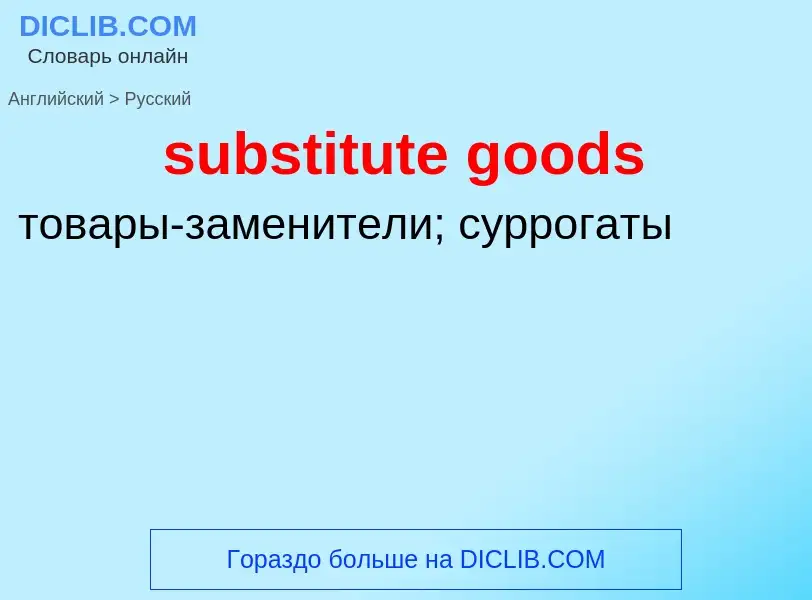Перевод и анализ слов искусственным интеллектом ChatGPT
На этой странице Вы можете получить подробный анализ слова или словосочетания, произведенный с помощью лучшей на сегодняшний день технологии искусственного интеллекта:
- как употребляется слово
- частота употребления
- используется оно чаще в устной или письменной речи
- варианты перевода слова
- примеры употребления (несколько фраз с переводом)
- этимология
substitute goods - перевод на русский
[gudz]
общая лексика
груз
грузовой
продукты
товары
строительное дело
изделия
материалы
Смотрите также
существительное
общая лексика
употр. с гл. в ед. и мн. ч.
товар
товары
вещи
имущество
багаж
груз
товары, иногда груз, багаж
вещи, имущество
(the goods) требуемые, необходимые качества
именно то, что нужно
(the goods) улики, вещественные доказательства, изобличающие преступника, поличное
грузовой, товарный
багажный
разговорное выражение
информация
улики
вещественные доказательства (the goods)
то
что требуется
что нужно
необходимые качества (the goods)
синоним
2) груз; багаж
- goods and chattels
- goods en route
- goods in bond
- goods in process
- goods in transit
- goods made on commission
- goods on hand
- goods on the hangers
- goods short delivered
- goods sold
- goods taxable
- press goods upon :
- send goods on approval
- turn out goods
- goods were allotted to the highest bidder
- goods of foreign origin
- abundant goods
- accumulable goods
- ascertained goods
- assorted goods
- back-to-school goods
- capital goods
- civilian goods
- complementary goods
- consumer goods
- consumption goods
- convenience goods
- current consumer goods
- damaging goods
- day-to-day goods
- defense goods
- drawback goods
- dry goods
- dumped goods
- durable goods
- durable consumer goods
- duty-free goods
- engineering-and-electrical goods
- express goods
- fabricated goods
- factored goods
- fancy goods
- fast-moving goods
- faulty goods
- finished consumer goods
- first order goods
- Giffen goods
- half-finished goods
- hard goods
- higher order goods
- home goods
- home-made goods
- household goods
- industrial goods
- inferior goods
- input goods
- investment goods
- joint-cost goods
- knit goods
- large-scale goods
- long-lived goods
- low-price special goods
- luxury goods
- Manchester goods
- manufactured goods
- measurement goods
- merchanted goods
- merit goods
- metal goods
- military goods
- nondurable goods
- nondurable consumer goods
- nonstrategic goods
- output goods
- over-priced goods
- perishable goods
- piece goods
- prepackaged goods
- price maintained goods
- private goods
- producer durable goods
- producers' goods
- production goods
- public goods
- quality goods
- reproducible goods
- scarce goods
- second-hand goods
- semidurable goods
- semifinished goods
- semimanufactured goods
- shopping goods
- slow-moving goods
- smuggled goods
- soft goods
- specialty goods
- spoiled goods
- spot goods
- standardized goods
- store goods
- strategic goods
- style-and-fashion goods
- substitute goods
- substitutional goods
- unclaimed goods
- undurable goods
- unfinished goods
- wage goods
- white goods
2) замена; субститут, заменитель || заменять; замещать
- substitute a draft for cash payment
- substitute machinery for workers
- close substitute
- close money substitute
- distant substitute
- money substitute
- perfect substitute
- remote substitute
Определение
Википедия
In microeconomics, two goods are substitutes if the products could be used for the same purpose by the consumers. That is, a consumer perceives both goods as similar or comparable, so that having more of one good causes the consumer to desire less of the other good. Contrary to complementary goods and independent goods, substitute goods may replace each other in use due to changing economic conditions. An example of substitute goods is Coca-Cola and Pepsi; the interchangeable aspect of these goods is due to the similarity of the purpose they serve, i.e fulfilling customers' desire for a soft drink. These types of substitutes can be referred to as close substitutes.
Substitute goods are commodity which the consumer demanded to be used in place of another good.
Economic theory describes two goods as being close substitutes if three conditions hold:
- products have the same or similar performance characteristics
- products have the same or similar occasion for use and
- products are sold in the same geographic area
Performance characteristics describe what the product does for the customer; a solution to customers' needs or wants. For example, a beverage would quench a customer's thirst.
A product's occasion for use describes when, where and how it is used. For example, orange juice and soft drinks are both beverages but are used by consumers in different occasions (i.e. breakfast vs during the day).
Two products are in different geographic market if they are sold in different locations, it is costly to transport the goods or it is costly for consumers to travel to buy the goods.
Only if the two products satisfy the three conditions, will they be classified as close substitutes according to economic theory. The opposite of a substitute good is a complementary good, these are goods that are dependent on another. An example of complementary goods are cereal and milk.
An example of substitute goods are tea and coffee. These two goods satisfy the three conditions: tea and coffee have similar performance characteristics (they quench a thirst), they both have similar occasions for use (in the morning) and both are usually sold in the same geographic area (consumers can buy both at their local supermarket). Some other common examples include margarine and butter, and McDonald's and Burger King.
Formally, good is a substitute for good if when the price of rises the demand for rises, see figure 1.
Let be the price of good . Then, is a substitute for if: .




